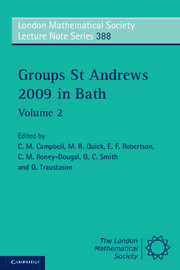Book contents
- Frontmatter
- Contents
- Introduction
- Algorithms for matrix groups
- Residual properties of 1-relator groups
- Words and groups
- The modular isomorphism problem for the groups of order 512
- Recent progress in the symmetric generation of groups
- Discriminating groups: a comprehensive overview
- Extending the Kegel Wielandt theorem through π-decomposable groups
- On the prime graph of a finite group
- Applications of Lie rings with finite cyclic grading
- Pronormal subgroups and transitivity of some subgroup properties
- On Engel and positive laws
- Maximal subgroups of odd index in finite groups with simple classical socle
- Some classic and nearly classic problems on varieties of groups
- Generalizations of the Sylow theorem
- Engel groups
- Lie methods in Engel groups
- On the degree of commutativity of p-groups of maximal class
- Class preserving automorphisms of finite p-groups: a survey
- Symmetric colorings of finite groups
- References
Maximal subgroups of odd index in finite groups with simple classical socle
Published online by Cambridge University Press: 05 July 2011
- Frontmatter
- Contents
- Introduction
- Algorithms for matrix groups
- Residual properties of 1-relator groups
- Words and groups
- The modular isomorphism problem for the groups of order 512
- Recent progress in the symmetric generation of groups
- Discriminating groups: a comprehensive overview
- Extending the Kegel Wielandt theorem through π-decomposable groups
- On the prime graph of a finite group
- Applications of Lie rings with finite cyclic grading
- Pronormal subgroups and transitivity of some subgroup properties
- On Engel and positive laws
- Maximal subgroups of odd index in finite groups with simple classical socle
- Some classic and nearly classic problems on varieties of groups
- Generalizations of the Sylow theorem
- Engel groups
- Lie methods in Engel groups
- On the degree of commutativity of p-groups of maximal class
- Class preserving automorphisms of finite p-groups: a survey
- Symmetric colorings of finite groups
- References
Summary
Abstract
We discuss the completion of the classification of maximal subgroups of odd index in finite groups with simple classical socle.
Introduction
The subgroup of a finite group G generated by the set of all its minimal non-trivial normal subgroups is called the socle of G and is denoted by Soc(G). A finite group is almost simple if its socle is a nonabelian simple group. It is well known that a finite group G is almost simple if and only if there exists a nonabelian finite simple group L such that L ≃ Inn(L) ⊴ G ≤ Aut(L). In this case Inn(L) = Soc(G). One of the greatest results in the theory of finite permutation groups was obtained by Liebeck and Saxl [7] and independently by Kantor [3]. They gave the classification of finite primitive permutation groups of odd degree. In particular, for each finite group G whose socle is a simple classical group they specified types of subgroups which can be maximal subgroups of odd index in G. However, not every subgroup of these types is a maximal subgroup of odd index in G. Thus, the classification of maximal subgroups of odd index in finite groups with a simple classical socle is not complete. In this paper, we discuss the completion of the classification of maximal subgroups of odd index in finite groups with simple classical socle.
Information
- Type
- Chapter
- Information
- Groups St Andrews 2009 in Bath , pp. 473 - 478Publisher: Cambridge University PressPrint publication year: 2011
References
Accessibility standard: Unknown
Why this information is here
This section outlines the accessibility features of this content - including support for screen readers, full keyboard navigation and high-contrast display options. This may not be relevant for you.Accessibility Information
- 1
- Cited by
